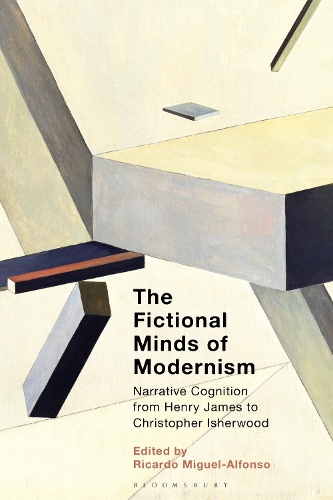
The Fictional Minds of Modernism: Narrative Cognition from Henry James to Christopher Isherwood
(Paperback)
Publishing Details
The Fictional Minds of Modernism: Narrative Cognition from Henry James to Christopher Isherwood
By (Author) Prof Ricardo Miguel-Alfonso
Bloomsbury Publishing PLC
Bloomsbury Academic USA
26th August 2021
United States
Classifications
Tertiary Education
Non Fiction
Literary studies: c 1900 to c 2000
Literary studies: fiction, novelists and prose writers
809.9112
Physical Properties
Paperback
256
Width 152mm, Height 230mm, Spine 16mm
366g
Description
Challenging the notion that modernism is marked by an inward turn a configuration of the individual as distinct from the world this collection delineates the relationship between the mind and material and social systems, rethinking our understanding of modernisms representation of cognitive and affective processes. Through analysis of a variety of international novels, short stories, and films all published roughly between 1890 and 1945 the contributors to this collection demonstrate that the so-called inward turn of modernist narratives in fact reflects the necessary interaction between mind, self, and world that constitutes knowledge, and therefore precludes any radical split between these categories. The essays examine the cognitive value of modernist narrative, showing how the perception of objects and of other people is a relational activity that requires an awareness of the constant flux of reality. The Fictional Minds of Modernism explores how modernist narratives offer insights into the real, historical world not as a mere object of contemplation but as an object of knowledge, thus bridging the gap between classical narratology and modernist experimentation.
Reviews
Smart, original, and thoroughly engrossing, Ricardo Miguel-Alfonsos new collection is a major achievement. This volume shows that the modernist writers explored here offered a radical rethinking of the relationship between mind, language, and world. The Fictional Minds of Modernism adds a new and fascinating dimension to our understanding of the philosophical import of literary modernism. * John Gibson, Professor of Philosophy, University of Louisville, USA *
Miguel-Alfonso's collection succeeds in its challenge to remain equally sensitive to fictional minds as both epistemological and aesthetic resources. Taking the empiricist impulse in late 19th century psychology as a prompt to rethink and redirect the 'inward turn' of Modernism, the collection makes an authoritative contribution to the field of cognitive literary studies and cognitive historicism. At the same time, like any good Modernist, it commits to introspection, reflecting, with each bold step forward, on the place of contemporary cognitive science in 21st-century literary studies. * David Ciccoricco, Associate Professor of English and Linguistics, University of Otago, New Zealand *
Author Bio
Ricardo Miguel-Alfonso is Associate Professor of American Literature at the University of Castilla-La Mancha, Spain. He is the author of El Romanticismo americano y la idea de la literatura (American Romanticism and the Idea of Literature) (2018).
